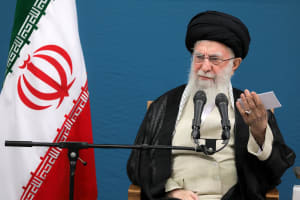Iran could build nukes even without Khamenei's decision – but missile program is more dangerous, says former US general
Former US CENTCOM chief: Iran doesn’t seek nuclear breakout at the moment

The Iranian regime is close enough to a nuclear breakout that even actions by lower-level officials could push it over the brink, however, the leadership doesn’t seek to do so at the moment, former US CENTCOM chief, General Kenneth McKenzie, told The Jerusalem Post in an interview.
McKenzie, who is now a distinguished fellow at the Jewish Institute for National Security of America (JINSA), said that the regime “doesn’t want to possess a nuclear weapon, but wants to be able to possess a nuclear weapon.”
“They are flirting with breakout. They can produce enough fissile material in a matter of weeks. But they have not chosen to do it. By not crossing that line, from which they could never come back, they can work on the US and the Europeans for concessions.”
“I think they are flirting with breaking out, but they have not made a decision to do it. The command and control in Iran is so rickety, that you cannot assume a decision by the Supreme Leader. This could happen at a lower level,” McKenzie said.
“The Iranians routinely have taken military action at lower levels without the approval of the Supreme Leader. There is no reason not to apply this to other elements as well and I would not be surprised,” he explained.
On Thursday, the US Mission to the United Nations again warned that Tehran’s nuclear program continues to expand despite international concerns, Iran International reported.
“Iran continues to move further in the wrong direction. Iran continues to expand its nuclear program, to install additional advanced centrifuge cascades, and to produce highly enriched uranium for which it has no credible peaceful purpose,” U.S. Ambassador Laura S.H. Holgate told the UN nuclear watchdog, International Atomic Energy Agency (IAEA).
“Indeed, Iran’s production of 60 percent enriched uranium runs counter to the behavior of all other non-nuclear weapons states party to the NPT,” the statement read.
McKenzie noted that while the regime’s nuclear program might be close to breakout, the “other half of the equation,” its missile program, might be more dangerous at the moment.
“What the Iranians have done over the last 10-15 years is improve their ballistic missile, drone, and land attack cruise missile capabilities,” McKenzie said, noting that their abilities reached a point where they “can gain overmatch against” its rivals Saudi Arabia, the United Arab Emirates, Bahrain and Qatar.
Despite the improvements, he said the rocket and missile attack against Israel in April fell short of Iran's expectations.
“They tested their template in mid-April. By any objective situational assessment, the attack failed. The Israelis are pretty good, the US assisted, neighbors in the region assisted, geography assisted given that Iranian missiles had to travel a long way.”
The failure in April is probably the main cause for the delay in Iran’s response following the assassination of Hamas leader Ismail Haniyeh in Tehran, which the regime blames on Israel.
“I think he got cold feet. The Supreme Leader said right after the strike in Tehran, that they would respond in 48 hours. Then nothing happened. Here is why. He listened to his military guys who told him ‘Our options against Israel will probably lead to the same result’,” the U.S. general explained.
Sam Lair, a research associate at the James Martin Center for Nonproliferation Studies in California, recently concurred with McKenzie's assessment, saying Iran's attack against Israel displayed “some ability to strike Israel.” However, he added, “If I were supreme leader, I would probably be a little disappointed.”
“Israel’s response to [Iran’s missile and drone assault] on April 13 was brilliant. They went into the Isfahan corridor and caused minimal damage. They used technological superiority with restraint. The Iranians are befuddled by it. They didn’t push the US away [by overreacting], they didn’t push other countries away from Israel… and the Iranians don’t have the capability to hurt Israel directly,” said McKenzie.

The All Israel News Staff is a team of journalists in Israel.
You might also like to read this:















